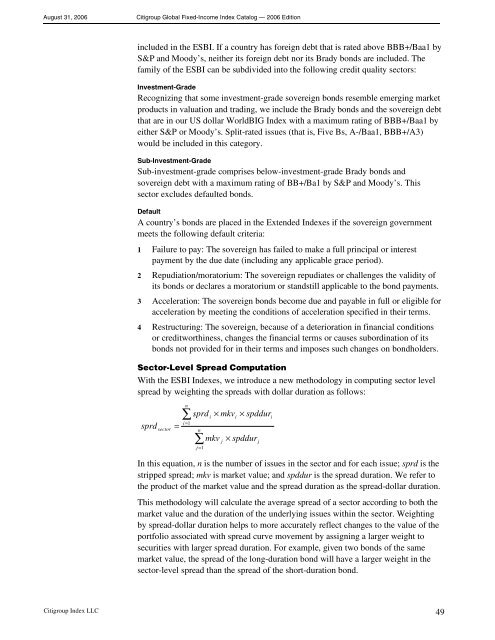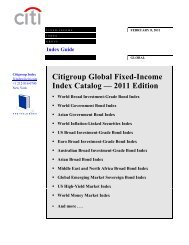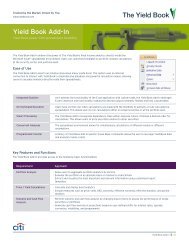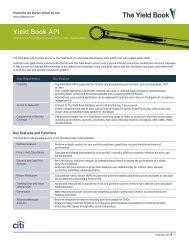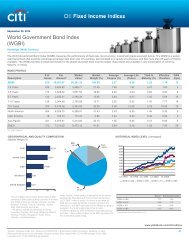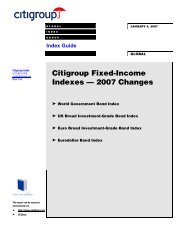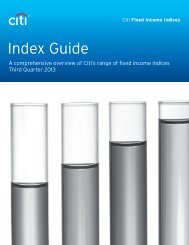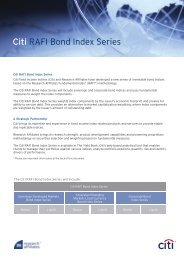Citigroup Global Fixed-Income Index Catalog ... - The Yield Book
Citigroup Global Fixed-Income Index Catalog ... - The Yield Book
Citigroup Global Fixed-Income Index Catalog ... - The Yield Book
- No tags were found...
Create successful ePaper yourself
Turn your PDF publications into a flip-book with our unique Google optimized e-Paper software.
August 31, 2006<strong>Citigroup</strong> <strong>Global</strong> <strong>Fixed</strong>-<strong>Income</strong> <strong>Index</strong> <strong>Catalog</strong> — 2006 Editionincluded in the ESBI. If a country has foreign debt that is rated above BBB+/Baa1 byS&P and Moody’s, neither its foreign debt nor its Brady bonds are included. <strong>The</strong>family of the ESBI can be subdivided into the following credit quality sectors:Investment-GradeRecognizing that some investment-grade sovereign bonds resemble emerging marketproducts in valuation and trading, we include the Brady bonds and the sovereign debtthat are in our US dollar WorldBIG <strong>Index</strong> with a maximum rating of BBB+/Baa1 byeither S&P or Moody’s. Split-rated issues (that is, Five Bs, A-/Baa1, BBB+/A3)would be included in this category.Sub-Investment-GradeSub-investment-grade comprises below-investment-grade Brady bonds andsovereign debt with a maximum rating of BB+/Ba1 by S&P and Moody’s. Thissector excludes defaulted bonds.DefaultA country’s bonds are placed in the Extended <strong>Index</strong>es if the sovereign governmentmeets the following default criteria:1 Failure to pay: <strong>The</strong> sovereign has failed to make a full principal or interestpayment by the due date (including any applicable grace period).2 Repudiation/moratorium: <strong>The</strong> sovereign repudiates or challenges the validity ofits bonds or declares a moratorium or standstill applicable to the bond payments.3 Acceleration: <strong>The</strong> sovereign bonds become due and payable in full or eligible foracceleration by meeting the conditions of acceleration specified in their terms.4 Restructuring: <strong>The</strong> sovereign, because of a deterioration in financial conditionsor creditworthiness, changes the financial terms or causes subordination of itsbonds not provided for in their terms and imposes such changes on bondholders.Sector-Level Spread ComputationWith the ESBI <strong>Index</strong>es, we introduce a new methodology in computing sector levelspread by weighting the spreads with dollar duration as follows:sprdsectorn∑sprdi=1=n∑j = 1i× mkvmkvji× spddur× spddurjiIn this equation, n is the number of issues in the sector and for each issue; sprd is thestripped spread; mkv is market value; and spddur is the spread duration. We refer tothe product of the market value and the spread duration as the spread-dollar duration.This methodology will calculate the average spread of a sector according to both themarket value and the duration of the underlying issues within the sector. Weightingby spread-dollar duration helps to more accurately reflect changes to the value of theportfolio associated with spread curve movement by assigning a larger weight tosecurities with larger spread duration. For example, given two bonds of the samemarket value, the spread of the long-duration bond will have a larger weight in thesector-level spread than the spread of the short-duration bond.<strong>Citigroup</strong> <strong>Index</strong> LLC 49


